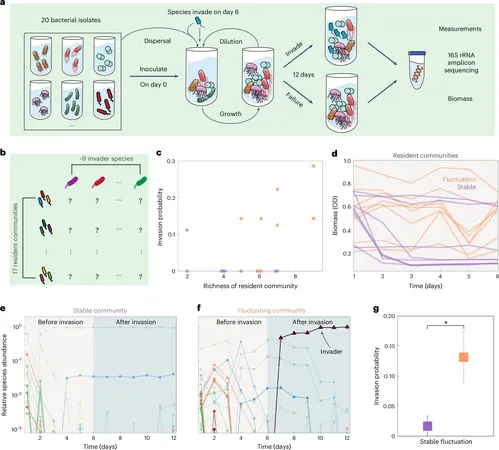
Revolutionary Formula Can Predict Species Invasions—Including in Your Gut!
2025-01-06
Author: Emily
Introduction
In an exciting scientific breakthrough, researchers from MIT have developed a predictive formula that determines the likelihood of a species successfully invading an ecosystem, including the human gastrointestinal (GI) tract. This groundbreaking work could have profound implications for ecology and health.
The Study
The study, spearheaded by physicist Jiliang Hu, analyzes the dynamics of species interactions using soil bacteria as a model to understand broader ecological principles.
Past hypotheses suggested that more diverse ecosystems could resist invasions better, as they usually have available niches filled. However, this research reveals that the truth is more complex: some highly diverse ecosystems are more prone to invasions.
Experimental Findings
By experimenting with over 400 communities of native soil bacteria, scientists introduced various 'invader' species and monitored the outcomes. Surprisingly, they found that fluctuations within these communities significantly influenced the success of the invasions.
More diverse communities that displayed internal fluctuations often managed to integrate new species more successfully, while stable environments with stronger interspecies competition saw higher failure rates for invaders.
Challenge to Traditional Theories
This discovery challenges traditional ecological theories and highlights the intricate balance within ecosystems.
Notably, these findings can be mapped onto the human gut microbiome. As Hu points out, while many consume probiotics hoping to enhance their gut health, the fact is that many often fail to establish themselves within the existing microbiome.
Insights on Probiotics and Gut Health
The researchers' formula could help determine which probiotics are likely to thrive and offer health benefits.
What's more, the timing of species introductions, known as the 'priority effect,' can also dictate invasion success. In ecosystems with strong interspecies interactions, arriving later diminishes a new species' chances of establishing itself.
Implications for Treatment
These insights open new doors to understanding both ecological stability and health-related species competition in the human body.
Excitingly, the MIT team aims to further test this model in natural ecosystems and human microbiomes, potentially predicting the effectiveness of treatments like fecal microbiota transplants (FMT). FMT is currently used to treat severe infections, such as those caused by *C. difficile*, by introducing beneficial bacteria from a healthy donor's stool.
Conclusion
In summary, this innovative research could not only reshape our understanding of ecological interactions but also revolutionize methods for improving gut health and treating infections. Stay tuned as scientists continue to explore the potential benefits of their findings. Will your next probiotic actually work? The answer could lie in this new formula!









 Brasil (PT)
Brasil (PT)
 Canada (EN)
Canada (EN)
 Chile (ES)
Chile (ES)
 Česko (CS)
Česko (CS)
 대한민국 (KO)
대한민국 (KO)
 España (ES)
España (ES)
 France (FR)
France (FR)
 Hong Kong (EN)
Hong Kong (EN)
 Italia (IT)
Italia (IT)
 日本 (JA)
日本 (JA)
 Magyarország (HU)
Magyarország (HU)
 Norge (NO)
Norge (NO)
 Polska (PL)
Polska (PL)
 Schweiz (DE)
Schweiz (DE)
 Singapore (EN)
Singapore (EN)
 Sverige (SV)
Sverige (SV)
 Suomi (FI)
Suomi (FI)
 Türkiye (TR)
Türkiye (TR)
 الإمارات العربية المتحدة (AR)
الإمارات العربية المتحدة (AR)